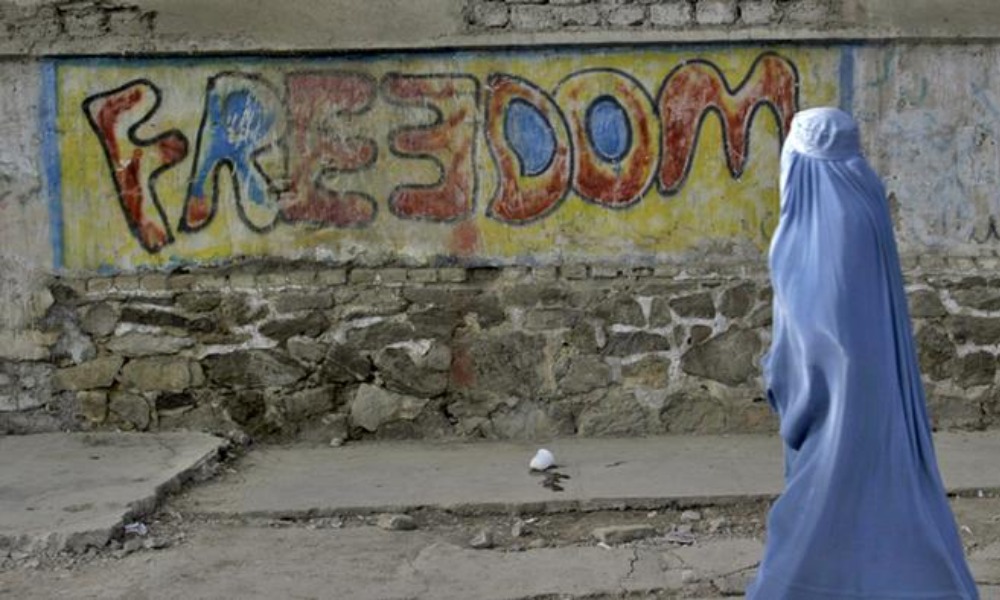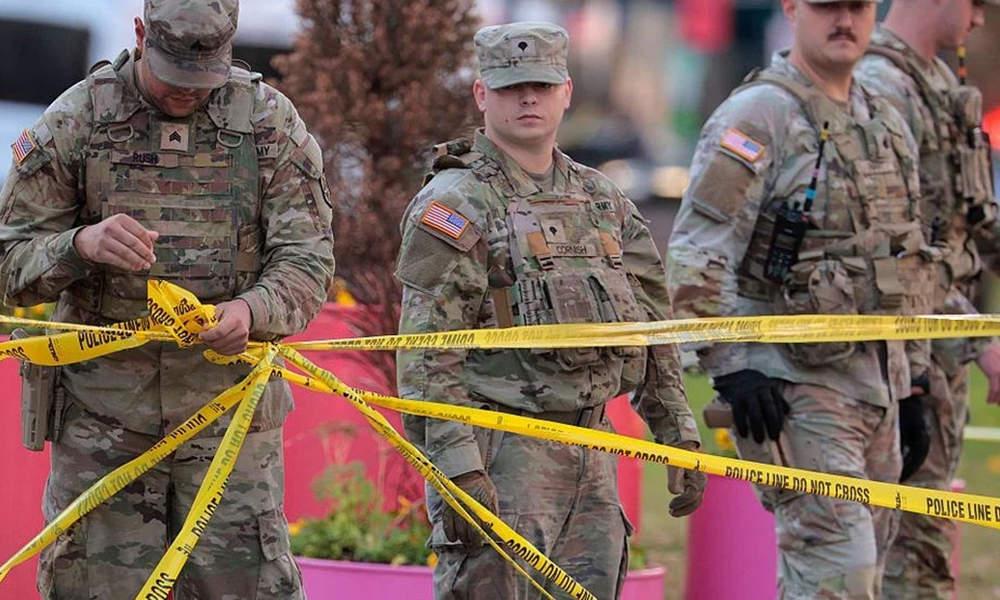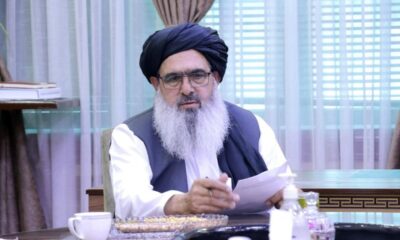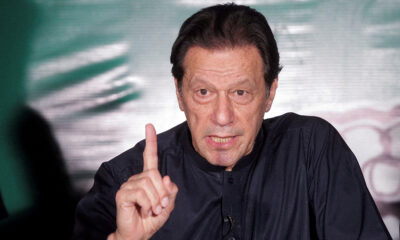Latest News
UN calls for increased efforts to stamp out violence against women

The United Nations has called on all Afghans to increase efforts to prevent violence against women and that the violence has negative consequences not only for survivors, but also for their families, communities, and society.
Marking the International Day for the Elimination of Violence against Women (EVAW), the UN called on Afghans “to increase efforts to prevent and redress violence against women and girls, particularly in the context of the outbreak of COVID-19.”
This comes on the heels of the Afghan Women’s Affairs Ministry’s announcement that violence against women has increased in the country in the past year.
Speaking at the launch of 16 Days of Activism Against Gender-based Violence, officials said 2,582 cases of violence against women have been recorded in the past six months.
According to the ministry, the cases of violence against women included forced marriage, rape, and murder.
The 16-day campaign, launched on Wednesday will through to December 10 – International Human Rights Day.
The EU meanwhile stated in a tweet: “We, the EU and its member states stand against Gender-Based Violence.”
They called for every girl and woman to live free from violence, oppression and discrimination. “Join our voices to put an end to violence against girls and women,” the EU said.
Meanwhile, the United Nations stated that this year’s EVAW theme – “Orange the World: Fund, Respond, Prevent, Collect!” – is focused on accelerating concrete policy responses to gender-based violence in the context of COVID-19 and promoting zero tolerance of gender-based violence across all spheres of society.
“The COVID-19 pandemic has exacerbated key risk factors for violence against women and girls, such as food shortages, unemployment, economic insecurity, and school closures,” a statement read.
“Worldwide, there has been an alarming increase in multiple forms of violence against women and girls, and information indicates that Afghanistan is no exception.”
The statement pointed out that the consequences of violence against women and girls – including physical, sexual, and psychological impacts – could prevent them from fully participating in society.
“Violence against women and girls has negative consequences not only for survivors, but also for their families, communities, and society. It is an impediment to the eradication of poverty, sustainable development, and efforts towards peace,” said Deborah Lyons, the Secretary-General’s Special Representative for Afghanistan and Head of UNAMA.
“In Afghanistan, violence against women and girls jeopardizes their enjoyment of fundamental human rights and freedoms at one of the most critical times in the modern history of the country”, stated Lyons.
“For millions around the world, the home became a safe space to protect us from a deadly virus. But for too many women and girls, the home became the place where they found themselves trapped with their abusers”, said Aleta Miller, UN Women Representative in Afghanistan.
“Our daily engagement with Afghan women across the country from the beginning of the pandemic flagged an alarming rise in the levels of violence against women and girls. Our data on the gender-differentiated impact of COVID-19 also matched this.”
“As it is an unprecedented time for Afghanistan, our solidarity with Afghan women and commitment to promoting and protecting their human rights must be equally unprecedented,” the UN noted.
The UN said that it is working with the Government, civil society, non-governmental organizations, and development partners in Afghanistan to respond to all forms of violence against women and girls through direct support to service providers, social norms programs to prevent violence, and campaigns and advocacy.
“During the 16 Days Campaign, the Afghan government, supported by the UN, is intensifying its advocacy and awareness-raising activities to address violence against women and girls,” the organization stated.
Latest News
Only one of three Afghan suspects was on US terror watch list of 18,000
The Office of the Director of National Intelligence has identified nearly 2,000 Afghans with suspected terror ties and continues to share intelligence with law enforcement agencies.

U.S. authorities are reviewing a classified terror watch list of about 18,000 people after it emerged that only one of three Afghan nationals arrested in recent high-profile cases was on the list, the New York Post reported, citing an intelligence source.
According to the NY Post, the revelation has raised concerns that some suspects may have been radicalized after arriving in the United States. The issue gained renewed attention following last month’s shooting of National Guard members in Washington, DC.
National Counterterrorism Center Director Joe Kent told lawmakers at a December 11 hearing that around 18,000 known or suspected terrorists entered the U.S. over a four-year period under the previous administration. Since then, officials have been combing through the database to assess potential threats and examine how certain individuals were admitted into the country.
Jaan Shah Safi was the only one of three recently arrested Afghan nationals listed in the Terrorist Identities Datamart Environment (TIDE), the U.S. government’s central terror database. Safi, who arrived in the U.S. in 2021 under Operation Allies Welcome, is accused of providing weapons and other support to ISIS-K. U.S. officials say he remains in ICE custody pending removal proceedings.
The other two suspects — Rahmanullah Lakanwal, charged with killing a National Guard member in Washington, and Mohammad Dawood Alokozay of Texas, accused of threatening a suicide attack — were not on the watch list, according to the Post. Intelligence officials cited in the report said this suggests they may have been radicalized after entering the United States.
The Post said the Office of the Director of National Intelligence has identified nearly 2,000 Afghans with suspected terror ties and continues to share intelligence with law enforcement agencies.
The issue has reignited debate over the vetting process used during the rapid evacuation of Afghans in 2021, when more than 100,000 people were brought to the United States.
Lawmakers and officials quoted by the New York Post called for closer scrutiny of those admitted during that period, amid growing political and public concern over national security and immigration policy.
Latest News
Afghanistan signs 30-year deal for marble mining in Daikundi

The Ministry of Mines and Petroleum of Afghanistan has signed a 30-year agreement with a private company to extract marble in Daikundi province.
Under the contract, the company will invest AFN 283 million in exploring and mining marble at the “Mesh-Uliya” site, spanning 16.74 square kilometers in central Daikundi.
Hedayatullah Badri, Minister of Mines and Petroleum, stated that the marble will be processed domestically before being exported abroad. He added that the Mesh-Uliya project is expected to create around 200 jobs, and the company is committed to supporting local communities through social initiatives.
Economic experts highlight that such investments, especially those focusing on domestic processing, are crucial for job creation, boosting exports, and strengthening the national economy. Analysts further note that the project will improve local infrastructure, expand social services, and enhance the economic and social well-being of Daikundi residents.
Since the return of the Islamic Emirate to power, efforts to develop Afghanistan’s mining sector have intensified, with multiple contracts signed in areas including cement, copper, iron, and lapis lazuli, involving both domestic and international companies.
Latest News
Passenger bus veers off Salang Highway, leaving 5 dead, dozens injured
-

 International Sports5 days ago
International Sports5 days agoILT20: Abu Dhabi Knight Riders end Desert Vipers’ unbeaten run in dramatic one-run win
-

 Latest News3 days ago
Latest News3 days agoAfghan border forces prevent illegal entry of hundreds into Iran
-

 Latest News2 days ago
Latest News2 days agoPakistan summons Afghan diplomat over deadly attack in North Waziristan
-

 Latest News3 days ago
Latest News3 days agoJapan allocates nearly $20 million in humanitarian aid for Afghanistan
-

 Latest News2 days ago
Latest News2 days agoAfghan health minister calls for medical cooperation between Kabul and New Delhi
-

 Latest News2 days ago
Latest News2 days agoKarzai urges reopening of girls’ schools and universities for Afghanistan’s bright future
-

 Health4 days ago
Health4 days agoAfghanistan seeks India’s support in standardizing traditional medicine
-

 World4 days ago
World4 days agoUS readies new Russia sanctions if Putin rejects peace deal, Bloomberg News reports

























